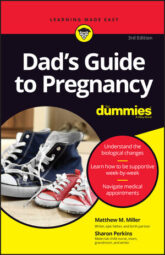Navigating the health insurance mélange has always been a bit of a headache for new dads. HMO, PPO — what does it all mean? For the most part, your insurance won't be any different after you have a baby. The only thing that definitely changes is the cost. For those parents without insurance — or those who can't afford it — the process is a bit more complex.
How dads add baby to an existing work-paid plan
Don't worry if baby doesn't arrive during your company's insurance open season. Whenever a major life event occurs, such as the birth of a baby, you're allowed to change your insurance coverage. Check with your HR department to get the proper paperwork for adding baby.
You won't actually add baby until after she's born. Your insurance company will need her name, sex, and birth date in order to issue a policy. However, baby's medical expenses are covered according to your current plan's postnatal coverage.
Policies are retroactive back to birth but don't continue to cover baby's expenses forever. Most plans require you to add baby within the first month of life or your child won't be covered under your plan.
The most important thing to consider when adding a baby to your insurance is the cost of plans. If you purchased your company's top-notch insurance plan, the cost may skyrocket out of your price range with the addition of a child.
Don't just add baby to your existing plan without first looking at the price of all the family plans your company offers. A different plan may save you hundreds of dollars every month.
Look for the plan that offers the highest level of coverage you can afford. Also, be sure to choose a plan with a reasonable copayment because your child will be going to the doctor frequently.
Be sure to call your insurance company to add your child to your plan as soon as possible. Some companies give you as little as 30 days to make the change following the birth of a baby, and because you'll be going to the doctor multiple times in those early weeks, you want to get the changes made ASAP so you aren't on the hook for some huge expenses.
When you add a child to a plan, the insurance company usually has a time limit for submitting proof of birth, such as a copy of the birth certificate, to make it official. Check with your insurance company for the deadlines and paperwork specific to your plan.
An explanation of coverage just for baby options for dads
The arrival of the Affordable Care Act (ACA) has everyone slightly confused about insurance coverage. The ACA requires everyone to have health insurance or incur a penalty — maybe.
Statistics show that more than 46 million Americans live without health insurance. That number includes 9 million children. If you're living without health insurance and about to have a baby, you're facing the high costs of labor and delivery, but the money hemorrhage doesn't stop after baby arrives.
Your child must have wellness checks and vaccination appointments frequently, which means you'll be shelling out a large portion of your hard-earned cash to your child's pediatrician.
If you're enrolled in a plan through the ACA, make sure you completely understand your coverage dates and what your plan provides. If you're switching plans, you have no cause for alarm — your insurance will still cover your childbirth as laid out in the plan you're purchasing, even if you subscribe after you're already pregnant.
Regardless of your stance on the ACA, consider buying a health insurance policy for your child. Even if you can't afford to buy coverage for you and your partner and have to pay for labor and delivery out of pocket, coverage for your baby is essential. Policies generally start around $100 per month, and, ultimately, you'll spend much less than if you pay 100 percent of the bills yourself.
How to obtain free and low-cost care for uninsured kids
If you don't have a work-sponsored health insurance program and can't afford to buy a policy for your child, yet you earn too much to qualify for Medicaid, explore the free or low-cost coverage options provided by both the federal and state governments.
Your child may qualify for coverage if you meet certain low-income standards. Visit InsureKidsNow to see whether your family qualifies for federal coverage and to find a provider in your state.
If you don't meet the low-income guidelines, many state-sponsored programs offer coverage. For the contact in your state, visit the National Association of Insurance Commissioners' website.

